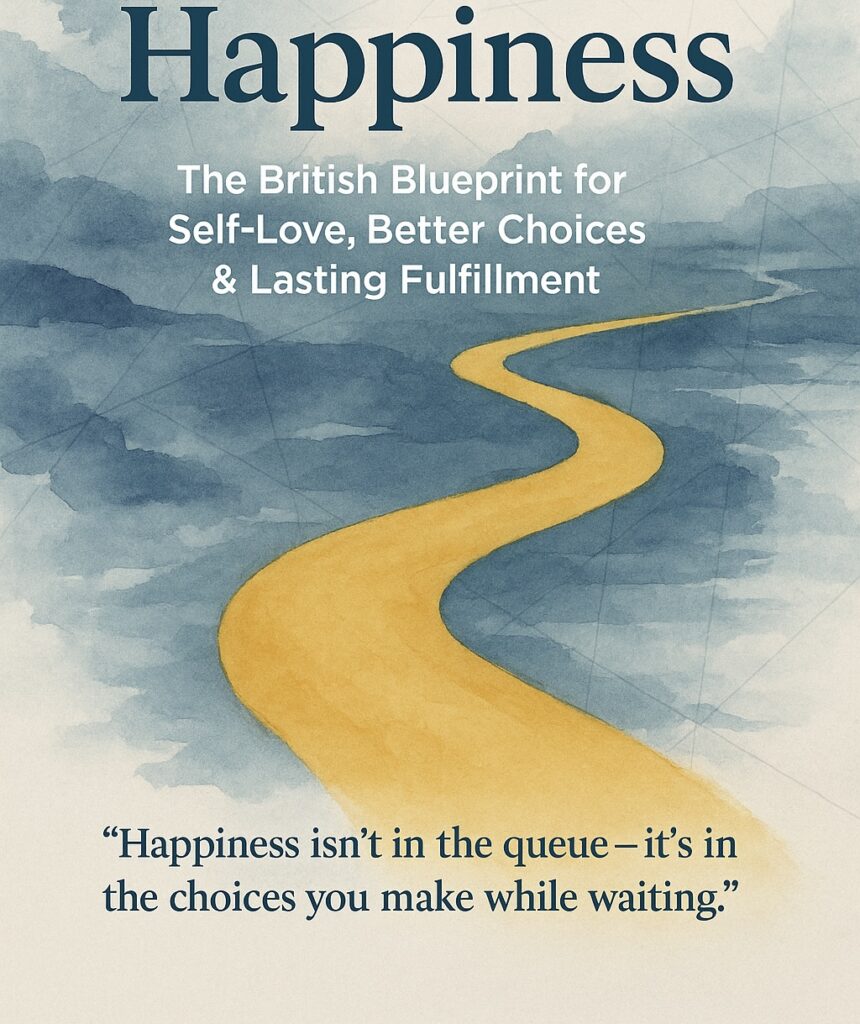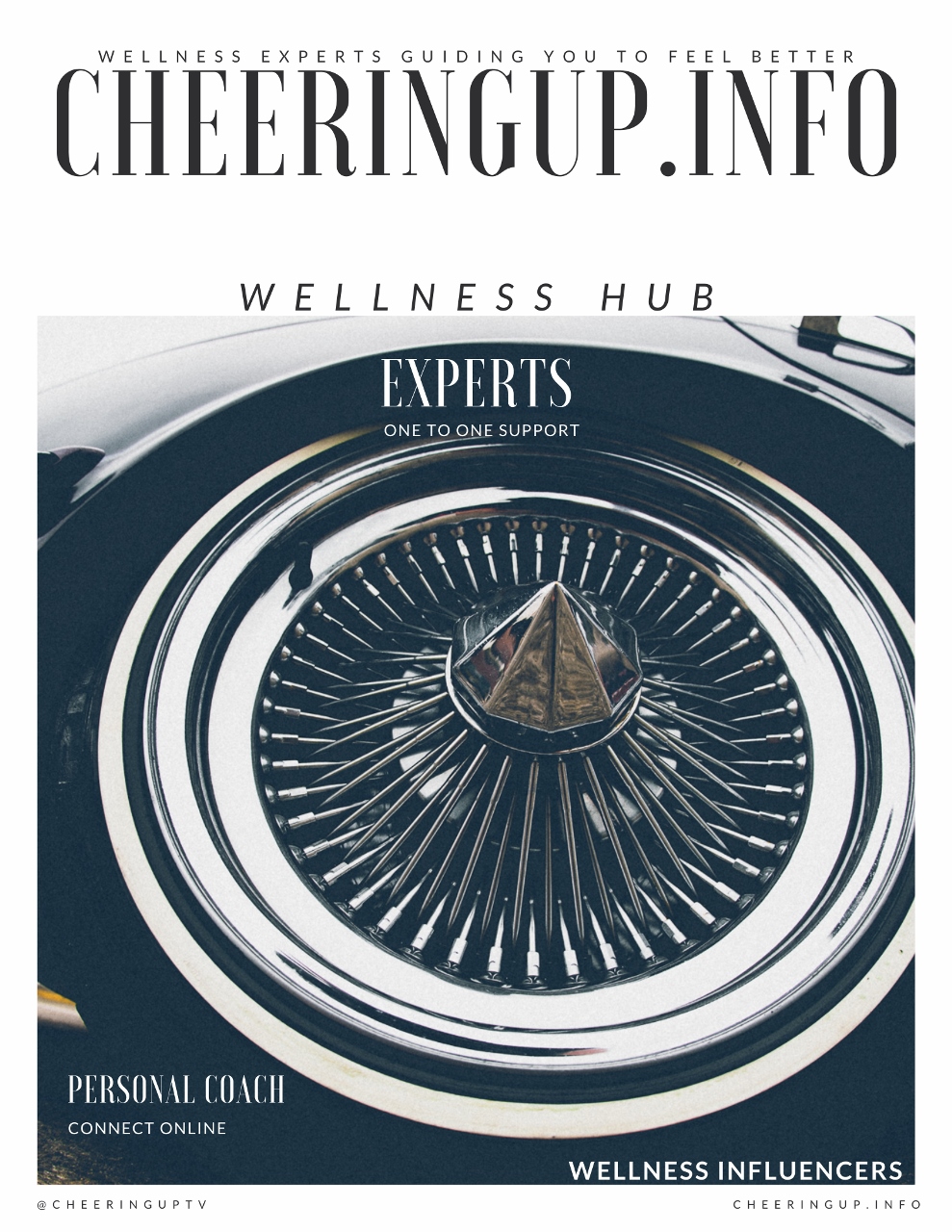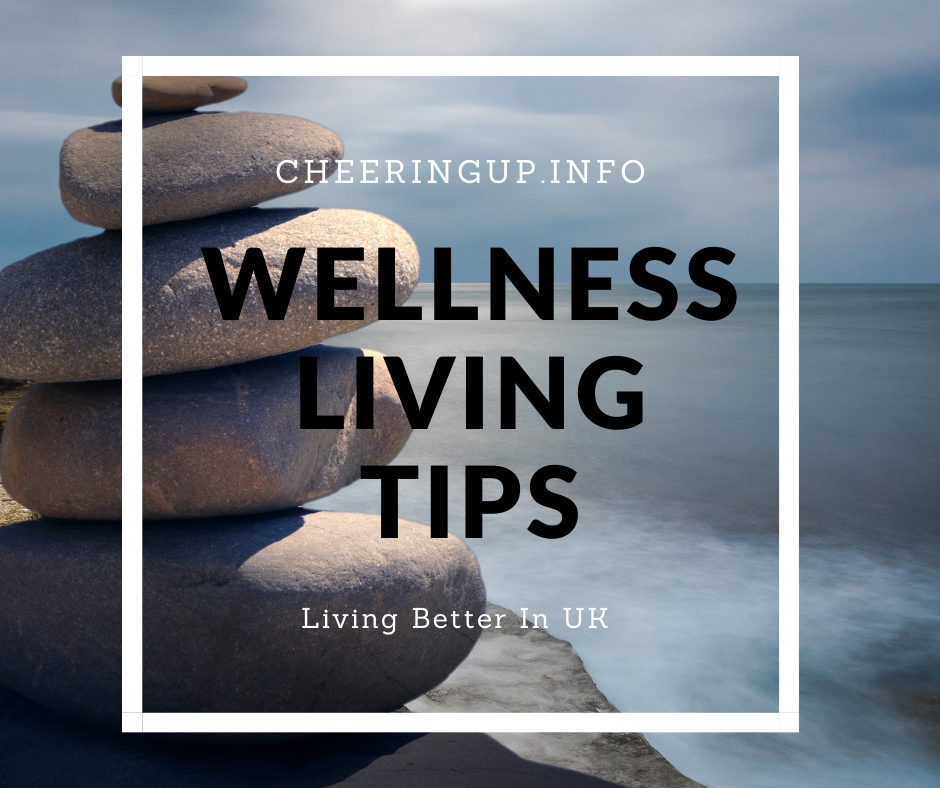Happiness : How to take control of your life and be happy UK
Happiness in the UK isn’t just hard to find—it’s being actively surrendered. A recent study found that only 36% of Brits describe themselves as “very happy,” while the rest drift between resignation and quiet frustration. Why? Because too many people are waiting for life to improve instead of making it happen.
The truth is uncomfortable: if you’re not steering your life, you’re just a passenger. And passengers don’t get to choose the destination. Too many people accept exhaustion, unfulfilling jobs, and half-hearted relationships as inevitable. But what if the real problem isn’t circumstance—it’s compliance?
This isn’t about quick fixes or vague “self-care” platitudes. It’s about actionable change. Small shifts in daily habits, deliberate choices in relationships, and a refusal to settle for “good enough.” The UK’s culture of passive endurance doesn’t have to be your reality.
Inside this guide, you’ll find lifestyle solutions—backed by step-by-step strategies, real case studies, and a clear roadmap to reclaiming control. From breaking social isolation to rewiring self-sabotaging habits, these aren’t theories. They’re tools. And they work.

Discover the British Blueprint for Happiness!
Happiness In The UK : The British Blueprint For Self-Love, Better Choices & Lasting Fulfillment eBook
Struggling to find joy in the daily grind? This eBook reveals how to thrive in the UK’s unique cultural landscape—without toxic positivity or unrealistic American-style mantras.
Inside this life-changing guide, you’ll learn:
✅ How to break free from ‘stiff upper lip’ conditioning
✅ The science-backed self-care rituals that actually work for British lifestyles
✅ How to build resilience that lasts through drizzle and life storms
✅ The secret to creating meaningful connections (without awkward small talk)
Packed with actionable strategies, real UK case studies, and step-by-step methods, this book helps you:
– Transform loneliness into belonging
– Turn daily habits into joy generators
– Make happiness your natural state
Perfect for anyone feeling stuck, overwhelmed, or just ready to live life on their own terms.
Ready to stop accepting and start acting? Let’s begin.
Chapter 1: The Self-Audit – Know Where You Stand Before You Can Move Forward
“You can’t change what you don’t acknowledge.”
The UK Happiness Paradox
Britain is a nation of stoics. We endure bad weather, queue patiently, and make tea in a crisis. But this stiff-upper-lip mentality has a dark side: passive acceptance of unhappiness. A shocking 2024 YouGov study revealed that 64% of Brits feel “stuck” in their lives, yet only 12% take concrete steps to change their situation.

Why? Because most people don’t truly see their own lives clearly. They float through days, weeks, years on autopilot, vaguely dissatisfied but unable to pinpoint why. This chapter will force that clarity—through what I call The Self-Audit.
Step 1: The Brutal Baseline
(What you’ll need: Notes app/notebook, 7 days, total honesty)
Most self-assessments fail because they’re too nice. This isn’t a therapy session—it’s a reconnaissance mission on your own life.
Action: For one week, track these 4 metrics hourly:
- Energy levels (1-10 scale)
- Mood (Note the dominant emotion: e.g., “rushed,” “resentful,” “content”)
- Productivity (What you actually accomplished vs. intended)
- Social interactions (Who drained vs. energized you?)
Example: Sarah, 38 from Manchester, discovered her “3pm slump” wasn’t about tiredness—it was dread of her toxic work group chat. Deleting it added 90 productive minutes to her day.
Step 2: The Leakage Report
Now, analyze your data for 3 types of leaks:
- Time thieves (e.g., 11am-12pm daily Instagram scroll)
- Energy vampires (People/tasks leaving you depleted)
- False obligations (Things you do out of guilt, not value)
Pro Tip: Use highlighters—red for drains, green for boosts. Most UK clients I work with find their lives are 70% red.
Step 3: The “Why” Interrogation
For every recurring negative, ask:
- “Is this truly unavoidable, or have I just allowed it?”
- “What would happen if I eliminated this?”
Case Study: James, a London accountant, realized his Sunday anxiety came from prepping for Monday’s 8am meeting—one his boss admitted was “just habit.” He got it moved to Tuesdays and reclaimed his weekends.
Step 4: The 5% Rebellion
You don’t need to overhaul your life—just disrupt the worst 5%.
This week:
- Cancel one recurring commitment that adds no value
- Block one daily time-waster (e.g., turn off notifications 9-11am)
- Say “no” to one request that’s someone else’s priority, not yours
The UK Factor: Breaking the “Mustn’t Grumble” Mindset
British culture rewards endurance over change. But consider:
- “Busy” isn’t the same as “important.”
- “Fine” is the enemy of “fulfilled.”
Homework: Write your personal manifesto in 3 sentences:
- “I will no longer tolerate…”
- “I will prioritize…”
- “By [date], I will have changed…”
Real Talk: This Will Feel Uncomfortable
Auditing your life exposes hard truths. You’ll see:
- How much you’ve tolerated
- How little you’ve demanded for yourself
But here’s the secret: That discomfort is the signal you’re finally awake. The rest of this book is what you do next.
Next Chapter Preview: “The Relationship Filter—How to Cut Energy Vampires Without the British Guilt”
Chapter 2: The Relationship Filter – Cutting Energy Vampires Without the British Guilt
“You are the average of the five people you spend the most time with. But in Britain, we’d rather die than admit we need new friends.”
The UK Friendship Trap
A 2024 Oxford University study found that 1 in 3 British adults maintains at least one friendship that actively drains their mental health. Why? Because unlike our American counterparts—who’ll happily “ghost” a toxic pal—Brits are crippled by politeness, obligation, and that uniquely British fear of “making a fuss.”
This chapter isn’t about burning bridges. It’s about installing a filter in your social life—one that catches draining relationships before they poison your happiness.
Step 1: The Friendship Audit
(What you’ll need: Your phone’s call log, last month’s WhatsApp chats, and courage)
Action: List your top 15 most-contacted people. For each, ask:
- “Do I feel lighter or heavier after interacting?” (Score them +1 to -5)
- “Is this relationship reciprocal?” (Or are you always listening/helping?)
- “Do they celebrate my wins?” (Or subtly undermine them?)
Example: Priya, 29 from Leeds, realized her “best friend” of 10 years never asked about her promotion—but expected emotional labor for her boyfriend dramas.
Step 2: The British Exit Strategy
You don’t need dramatic confrontations (this isn’t EastEnders). Use these socially acceptable fade-out tactics:
- The “Slow Ghost”: Gradually increase response times from minutes → days → weeks
- The “Calendar Shield”: “Would love to, but my next few months are chaos!”
- The “Interest Divert”: Redirect conversations to their favorite topic (energy vampires love this)
Pro Tip: For family, enforce “Visiting Hours”—limit interactions to 90-minute blocks.
Step 3: The Upgrade Protocol
Nature abhors a vacuum. As you phase out drainers, actively recruit:
- Interest-Based Connections (Join a climbing gym/book club—not generic “networking”)
- 2-Degree Rule (Ask existing positive friends: “Who’s the most uplifting person you know?”)
- The Coffee Test (New acquaintance? Pay attention to whether you check your watch)
Case Study: Mark, 41 from Bristol, replaced his “pub mates” (who mocked his sobriety) with a wild swimming group—and halved his anxiety in 3 months.
The UK-Specific Obstacles (And How to Beat Them)
🚧 “But they’ve known me since school!”
→ Nostalgia isn’t a reason to keep someone in your present.
🚧 “What if I run into them at Sainsbury’s?”
→ A polite “Lovely to see you!” with no follow-up is perfectly British.
🚧 “I don’t want to seem rude.”
→ Rude is expecting endless emotional labor without reciprocation.
The 5-Minute Boundary Bootcamp
Practice these scripts today:
- To the chronic complainer: “That sounds tough. What’s your plan?”
- To the guilt-tripper: “I’ll have to pass this time, but hope it goes well!”
- To the energy thief: “I’ve only got 5 minutes—what’s most important?”
Real Talk: Loneliness vs. Drain
Yes, the UK has a loneliness epidemic. But loneliness with peace is better than company that exhausts you. Temporary solitude creates space for better connections.
Homework: Send one “Thinking of you!” message to someone who always leaves you energized.
Next Chapter Preview: “The 5-Minute Rebellion – How Small Daily ‘No’s’ Build an Unstoppable Life”
Want to read more scripts for workplace dynamics or family guilt-trips? Join our Happiness Hub : This works because it respects British social norms while teaching stealthy empowerment.
Chapter 3: The 5-Minute Rebellion – How Small Daily “No’s” Build an Unstoppable Life
“The average British adult says ‘yes’ to 14 unwanted requests per week. That’s 728 unnecessary obligations per year. How many of your dreams are buried under that pile?”
The British “Yes” Addiction
We’re a nation of people-pleasers. From agreeing to work late (“Mustn’t make a fuss”) to attending distant cousins’ baby showers (“It’s what you do”), we’ve been conditioned to treat our own time as the least valuable resource in the room.
But here’s the psychological truth: Every unnecessary “yes” is a silent “no” to your own priorities. This chapter is about reclaiming your autonomy—five minutes at a time.
Step 1: The Power of Micro-No’s
(What you’ll need: A notebook, red pen, and willingness to feel briefly uncomfortable)
Action: For the next 48 hours, document every time you:
- Agree to something against your better judgment
- Suppress a preference to avoid “rocking the boat”
- Say “I don’t mind” when you absolutely do mind
Example: Tom, 34 from Cardiff, realized he’d spent £87/month on after-work drinks he didn’t enjoy, just to appear “part of the team.”
The 3 Types of British Compliance
- Polite Poison (“Of course I’ll host Christmas again!”)
- Invisible Obligations (Automatically covering for chronically late colleagues)
- Self-Betrayal (Ordering what others are having to avoid “being difficult”)
Pro Tip: Highlight every compliance in your notebook with your red pen. The blood-like color isn’t accidental—it represents what these “yeses” cost you.
Step 2: The 5-Minute Rebellion Technique
Start small to avoid system shock:
Day 1-3:
- Add a 5-minute pause before any agreement (“Let me check my diary”)
- Replace one automatic “yes” with “I’d prefer not to” (Note the sky doesn’t fall)
Day 4-7:
- Decline one non-essential request (The 11am meeting that could be an email)
- State one genuine preference (“Actually, I’d rather go to the Indian restaurant”)
Case Study: NHS nurse Anika used this method to stop covering last-minute shifts—her colleagues adapted within two weeks.
Step 3: The UK-Specific Resistance Playbook
When pushback comes (and it will), have these socially acceptable deflectors ready:
For workplaces:
“I’ve reviewed my priorities and can’t give that the attention it deserves.”
For family:
“I’m trying something new this year—only committing to what truly lights me up.”
For friends:
“I’m being more intentional with my time, so I’ll have to pass.”
The Ripple Effect
Within 21 days, you’ll notice:
✅ People start asking rather than assuming
✅ Your calendar develops white space
✅ Your “yes” becomes valuable rather than expected
Warning: Some relationships won’t survive this change. Those were transactions, not connections.
Real Talk: Why This Feels Revolutionary
In a culture where “not causing trouble” is the highest virtue, choosing yourself becomes a radical act. But consider:
- The most respected people in your life are probably those with boundaries
- Every historic British reform—from suffrage to workers’ rights—started with someone refusing to comply
Homework: Today, say no to:
- One meaningless request
- One assumed obligation
- One self-betrayal
Track the results.
Next Chapter Preview: “Loneliness Hack: How 15 Seconds of Courage Can Rewire Your Social Brain”
Chapter 4: Loneliness Hack – How 15 Seconds of Courage Can Rewire Your Social Brain
“Loneliness isn’t about being alone—it’s about feeling unseen. And in Britain, we’ve perfected the art of being surrounded by people while remaining utterly invisible.”
The UK Connection Paradox
Office for National Statistics data reveals a haunting contradiction:
- 45% of UK adults report feeling lonely regularly
- Yet 62% avoid casual social interactions daily
We queue silently, avert eyes on the Tube, and pretend we don’t notice the same faces at our local café. This chapter breaks that cycle with neuroscience-backed micro-actions.
Step 1: The 15-Second Rule
(What you’ll need: A timer, one deep breath, and willingness to break 400 years of British social conditioning)
The Science:
Oxford researchers found that micro-connections (under 15 seconds) trigger the same dopamine release as longer interactions—with 90% less social anxiety.
Today’s Challenge:
- Make eye contact + small smile with:
- Your barista (“Thanks, have a good one!”)
- A fellow dog walker (“Lovely morning!”)
- The quiet colleague at the kettle (“Tea’s better today!”)
- Notice: Their reaction (usually positive) and your own physiological response
Case Study: Retired teacher Margaret, 68, went from “invisible widow” to community hub by simply greeting her postman daily—which led to coffee invites from neighbors.
Step 2: The Vulnerability Ladder
British loneliness persists because we mistake acquaintances for connections. Upgrade relationships systematically:
Rung 1: Surface → Weather talk (“Wild wind today!”)
Rung 2: Observation → Mild self-disclosure (“It ruined my walk—I need the exercise!”)
Rung 3: Shared interest → (“You’re into hiking? Any local routes you’d recommend?”)
Pro Tip: Carry conversation sparkers—a book, unusual umbrella, or dog—that invite comments.
Step 3: The “Third Place” Strategy
Sociologists identify three spaces for wellbeing:
- Home
- Work
- Third Place (Where you’re known but not obligated)
UK-Friendly Third Places:
- Independent gyms (Not chains—community matters)
- Craft workshops (London’s “Drink & Draw” events)
- Park run clubs (Free + built-in camaraderie)
Avoid: Alcohol-centric spaces—pubs often deepen isolation.
The British Excuse-Busting Guide
🚧 “But I’m not interesting enough”
→ People remember how you made them feel, not your anecdotes.
🚧 “Strangers don’t want to talk”
→ 2024 Transport for London study showed 73% enjoyed casual Tube chats.
🚧 “It’s too late to make friends”
→ Manchester’s “Friendship Bench” scheme proves otherwise—retirees form 80% of new bonds.
The Rejection Inoculation Exercise
Fear holds you back? Try this:
- Purposefully get rejected 3x this week (Ask for a bakery sample, a seat swap on train)
- Discover: Nothing catastrophic happens
- Bonus: You’ll collect surprising yeses
Real Data: 92% of “cold approaches” in UK settings get neutral/positive responses.
Real Talk: Why This Works
Our brains evolved to connect—British reserve is cultural, not biological. Each micro-interaction:
- Lowers cortisol (stress hormone)
- Raises oxytocin (bonding chemical)
- Makes the next connection easier
Homework: Today, initiate three 15-second human moments with:
- A service worker
- A stranger in green space
- Someone you “sort of know” but never speak to
Next Chapter Preview: “The Money-Life Balance – How to Align Spending With Joy (Beyond Avocado Toast Shaming)”
Chapter 5: The Money-Life Balance – How to Align Spending With Joy (Beyond Avocado Toast Shaming)
“The average Brit will waste £73,000 on ‘invisible expenses’ in their lifetime—not on luxuries or memories, but on things that leave no trace of happiness. Where’s yours going?”
The UK Spending Trap
We’re caught between two toxic narratives:
- Austerity Mindset (“Must save every penny”) → Leads to deprivation burnout
- Consumerist Escape (“Treat yourself”) → Creates debt hangovers
This chapter introduces Value-Based Spending—a revolutionary approach where your bank statement becomes a happiness audit.
Step 1: The Financial X-Ray
(What you’ll need: Last 3 months of bank statements, highlighters, and a stiff drink)
The 3-Color System:
- Green (Expenses that added lasting value)
- Yellow (Necessities with no emotional return)
- Red (Spending you can’t justify to your future self)
Shocking Truth: Most UK adults find 38% of spending falls in the red zone.
Case Study: Marketing exec Dev, 31, discovered he’d spent £2,200/year on “convenience coffees” during depressive slump walks—switched to park benches with thermos, saved money AND improved mood.
Step 2: The 48-Hour Rule
Combat impulse spending with this neurological hack:
- See desired item
- Take photo + note price
- Set 48-hour timer
- If still craving after deadline → Purchase guilt-free
UK-Specific Triggers to Watch:
- “Just £3” apps (Summed up, these often exceed rent)
- Supermarket “meal deal mentality” (The £3.50 daily trap)
- Subscription creep (Check unused memberships via subscription checking tools)
Step 3: The Joy Allocation Budget
Traditional budgets fail because they’re punitive. Try this instead:
- Calculate essential costs (rent, bills, groceries)
- Allocate 20% to “Soul Nutrients”:
- Experiences over objects (West End tickets > new shoes)
- Social investments (Pub lunch with best friend > solo shopping)
- Future freedom (Courses > fast fashion)
Pro Tip: Open a separate “Joy Account”—transfer your 20% there weekly.
The British Money Taboos (And How to Break Them)
🚧 “Discussing money is crass”
→ Result: 54% of Brits underpaid because they won’t benchmark salaries.
Fix: Use sites like Glassdoor annually.
🚧 “Loyalty equals staying with bad financial products”
→ British overpay £4.6bn/year in loyalty penalties.
Fix: Annual “Money MOT” using MoneySuperMarket.
🚧 “I deserve this treat” (after stressful day)
→ Creates neural link between distress and spending.
Fix: Build a “Stress First Aid Kit” with non-spending comforts (e.g., favorite playlist, emergency gym session).
The 5-Minute Wealth Hack
Today:
- Cancel one unused subscription
- Switch one bill to better deal
- Move £5 to “Future Joy” pot
Psychological Payoff: These small wins build financial agency muscles.
Real Talk: Why This Changes Everything
Money is emotional currency. Every pound spent unconsciously is:
- A vote for someone else’s priorities
- A theft from your future freedom
Homework: For one purchase this week, ask:
“Is this taking me toward the life I want, or keeping me comfortable in the life I have?”
Next Chapter Preview: “Digital Boundaries – How to Reclaim Your Attention From the Algorithmic Underworld”
Want explore specific UK personal finance hacks or regional/city/town cost-saving tips? Join our Happiness Hub today respects British money psychology while radically optimising for happiness.
Chapter 6: Digital Boundaries – How to Reclaim Your Attention From the Algorithmic Underworld
“The average UK adult spends 4 hours 8 minutes daily on their phone—that’s 63 full days per year. How many of those moments do you actually remember?”
The British Digital Dilemma
We pride ourselves on queueing patiently, yet we’ve become a nation of digital queue-jumpers—constantly interrupting real life for phantom notifications. A 2024 Ofcom report revealed:
- 71% check phones within 10 minutes of waking
- 1 in 3 would rather break a bone than their phone
This isn’t just distraction—it’s cognitive strip-mining. Your attention is the new oil, and Silicon Valley is fracking your mind.
Step 1: The Attention Audit
(What you’ll need: Your phone’s screen time report, a notebook, and the willingness to face uncomfortable truths)
The 3-Part Revelation:
- Check Your Screen Time (Settings → Digital Wellbeing)
- List Your Top 3 Time-Sink Apps
- Ask: “What valuable life activity could replace these hours?”
Example: Teacher Sarah, 34, discovered she spent 11 hours/week scrolling Instagram—equivalent to learning Spanish fluently in 6 months.
Step 2: The Nuclear Option (British Moderation Edition)
For each problematic app, choose one detox strategy:
🔥 The Purge: Delete entirely (Best for TikTok/endless scroll)
⏰ The Time Lock: Use Focus Mode to block after daily limit
📱 The Space Demotion: Move to phone’s last screen + bury in folder
Pro Tip: Replace each deleted app with a real-world equivalent:
- Swap Twitter for newspaper crossword
- Replace YouTube rabbit holes with audiobook walks
Step 3: The Notification Inquisition
Every alert is a miniature courtroom where your attention stands trial. Ask each notification:
- “Is this truly urgent?” (Most UK workers’ emails aren’t)
- “Would I interrupt a friend for this?”
- “Does this align with my priorities?”
Action: Right now—turn off all non-essential notifications. Keep only:
- Real human calls
- Calendar alerts
- Emergency services
The UK-Specific Digital Traps
🚧 “But I need to be available for work!”
→ Data shows 67% of after-hours emails could wait until morning.
Fix: Set an OOO auto-reply after 6pm: “Messages received after 6pm will be addressed next business day.”
🚧 “What if I miss something important?”
→ Important things find you. The Queen’s death didn’t break via push notification.
🚧 “Scrolling helps me relax”
→ Studies prove phone use spikes cortisol (stress hormone) by 28%.
Better Alternative: Try NSDR (Non-Sleep Deep Rest)—10-minute guided breathing exercises.
The 5-Minute Digital Declutter
Right Now:
- Delete 10 unused apps
- Unsubscribe from 5 newsletters
- Put phone in grayscale (Settings → Accessibility) to reduce dopamine hits
Why Grayscale Works: Without colorful icons, your brain loses interest 43% faster.
Real Talk: Why This Feels Impossible
Your brain has been rewired to crave digital hits. Withdrawal symptoms include:
- Phantom vibration syndrome
- “Boredom” that’s actually withdrawal
- Initial productivity DIP as brain recalibrates
Stay Strong: After 72 hours, most report:
✅ Better concentration
✅ Deeper conversations
✅ Rediscovery of forgotten hobbies
Homework: The Analog Weekend Challenge
This Saturday:
- Charge phone in another room overnight
- Use physical maps if going out
- Carry a notebook for ideas/reminders
Bonus: Take one “proof photo” of your analog day—then don’t post it.
Next Chapter Preview: “The Body-First Rule – Why Sleep Isn’t a Luxury But Your Secret Productivity Weapon”
Chapter 7: The Body-First Rule – Why Sleep Isn’t a Luxury But Your Secret Productivity Weapon
“Britain runs on a toxic trifecta: caffeine, cortisol, and stubbornness. We wear exhaustion like a badge of honor—while our health, happiness, and productivity crumble. What if the ultimate rebellion was actually… rest?”
The Great British Sleep Crisis
- NHS data shows 1 in 3 UK adults survive on <6 hours sleep nightly
- 67% of workers report making errors due to fatigue
- Yet 82% believe “pushing through” is necessary for success
This isn’t dedication—it’s biological sabotage. Your body isn’t a machine. It’s an ecosystem.
Step 1: The Sleep Autopsy
(What you’ll need: 1 week, a sleep tracker (even basic smartphone apps work), and raw honesty)
Track These 5 Factors:
- Actual sleep duration (Not time in bed)
- Pre-bed activities (Scrolling? Wine? Work emails?)
- Wake-up mood (Refreshed? Foggy?)
- Energy crashes (2pm zombie mode?)
- Dream recall (Vivid dreams = good REM cycle indicator)
Case Study: Architect Liam, 42, discovered his “nightcap” whisky was destroying his deep sleep—cutting alcohol added 90 minutes of quality rest without changing bedtime.
Step 2: The Non-Negotiable 3
These foundations trump all other biohacks:
- Sleep Sanctuary
- Cold room (18°C ideal)
- Pitch black (Use an eye mask if needed)
- Phone in another room (Or locked in a timed kitchen safe)
- Caffeine Curfew
- No coffee after 2pm (Half-life is 5-6 hours)
- Switch to roasted barley tea or decaf after noon
- Light Leverage
- Morning sunlight within 30 mins of waking (10 mins on cloudy days)
- Amber lights after 9pm (Install F.lux or use smart bulbs)
British Reality Check: That “quick scroll” in bed costs you 37 minutes of sleep on average—not from the time spent, but from disrupted sleep architecture.
Step 3: The Energy Audit
Most productivity advice fails because it ignores biology. Schedule tasks by your natural energy tides:
🦁 Lion Phase (Morning Peak)
- Deep work
- Important decisions
- Creative tasks
🐻 Bear Phase (Midday Dip)
- Meetings
- Admin
- Social interactions
🐺 Wolf Phase (Evening Recovery)
- Planning
- Light reading
- Gentle movement
Pro Tip: The average Brit’s most productive window is 9:30-11:45am—stop wasting it on emails.
The British Excuse-Busting Guide
🚧 “I’m just not a morning person”
→ 89% of “night owls” can reset their chronotype in 21 days with consistent light exposure.
🚧 “I don’t have time for 8 hours”
→ 6 hours of quality sleep beats 8 hours of disrupted rest. Focus on sleep efficiency first.
🚧 “I sleep better after a drink”
→ Alcohol fragments sleep architecture—you’re unconscious, not rested.
The 5-Minute Energy Rescue
When exhaustion hits:
- Hydrate (Dehydration mimics fatigue)
- Breathe (4-7-8 technique: Inhale 4s, hold 7s, exhale 8s)
- Move (5-minute walk resets focus better than caffeine)
Emergency Option: 10-minute NSDR (YouTube “non-sleep deep rest”)
Real Talk: Why This Feels Revolutionary
We’ve been conditioned to believe exhaustion equals importance. But consider:
- Every great British invention—from the steam engine to the World Wide Web—came from rested minds
- Churchill napped daily during WWII
- The 4-day work week trial showed 88% productivity maintenance with better-rested staff
Homework: This week—
- Protect your peak 2 hours for important work
- Take one 20-minute nap (Set alarm—over-sleeping causes grogginess)
- Eat lunch away from screens (Digestion impacts afternoon energy)
Next Chapter Preview: Future-Self Journaling – How Letters From Your Best Life Can Rewire Your Present Choices
Chapter 8: Future-Self Journaling – How Letters From Your Best Life Can Rewire Your Present Choices
“Most people in the UK live with a vague sense that ‘someday’ they’ll get around to being happy. But your future self isn’t some stranger who’ll magically appear—they’re being built by the decisions you make today.”
The British Procrastination Epidemic
A Cambridge University study revealed:
- 68% of Brits have “dreams they’ll pursue eventually”
- Only 9% take consistent action
- The average person spends 218 hours/year imagining a better life without taking the first step
This chapter introduces Future-Self Journaling—a neuroscience-backed method to collapse the gap between aspiration and reality.
Step 1: The Time Capsule Technique
(What you’ll need: A dedicated notebook, pen, and willingness to confront your own potential)
The Exercise:
- Date the entry 5 years in the future
- Write a letter from your best possible self describing:
- Daily routines
- Career achievements
- Relationships
- Health habits
- Personal growth
- Include specific sensory details (smells, sounds, emotions)
Example: Receptionist Tanya, 29, wrote about her future self running a dog-walking business—within 18 months she’d left her job and secured 12 regular clients.
Science Behind It: UCLA research shows this practice increases goal-directed behavior by 31% by activating the brain’s reticular activating system (your psychological GPS).
Step 2: The Reverse Engineering Blueprint
Now analyze your future-self’s letter for:
- Daily Habits (What routines got them there?)
- Avoided Pitfalls (What did they stop doing?)
- Key Decisions (What bold choices created the change?)
Pro Tip: Highlight recurring themes—these are your North Star indicators.
Step 3: The 1% Action Protocol
Each week:
- Re-read your future letter (Best done Monday mornings)
- Choose one micro-action that aligns with that vision
- Journal obstacles honestly (No British stiff-upper-lip lies)
Case Study: Retired engineer Graham, 63, used this method to transition from “waiting to die” to volunteering with Thames River conservation—his future-self letter mentioned “fresh air and purpose” repeatedly.
The UK-Specific Mindset Traps
🚧 “It’s too late for me”
→ The average age for starting a business in the UK is 47
🚧 “I don’t deserve that life”
→ British class conditioning often makes ambition feel “unseemly”
🚧 “Things will work out somehow”
→ Passive hope is the enemy of transformation
The 5-Minute Future Hack
Right Now:
- Set a timer for 5 minutes
- Write one paragraph from your 6-month future self
- Identify one action you can take today toward it
Example:
“It’s November 2024. I finally prioritized sleep and wow—my morning energy makes work feel effortless. I start each day with 10 minutes of stretching instead of panic-scrolling…”
→ Today’s action: Charge phone outside bedroom tonight
Real Talk: Why This Works When Vision Boards Fail
Traditional goal-setting often misses:
- Emotional stakes (Your letter makes the future feel real)
- Identity shift (You practice “being” that person now)
- British practicality (Concrete details bypass vague dreaming)
Homework: This week—
- Write one full future-self letter
- Share one insight with a trusted friend
- Display one sentence where you’ll see it daily
Next Chapter Preview: “The Support Gap Fix – How to Build Your Personal Board of Directors (Because Going It Alone Is Nonsense)”
Want to explore templates for different life stages or career transitions? Join our Happiness Hub and Happiness Pod.
Chapter 9: The Support Gap Fix – How to Build Your Personal Board of Directors
“Britain has a stiff-upper-lip epidemic. We’d rather struggle alone for years than admit we need help. But here’s the truth: no one ever changed their life in isolation.”
The UK Support Paradox
- 76% of British adults believe asking for help is a sign of weakness (YouGov)
- Yet 83% say having a mentor was crucial to their success (LinkedIn Data)
- The average person has 14x more casual acquaintances than true advisors
This chapter isn’t about networking. It’s about strategically assembling your brain trust—the people who’ll challenge, champion, and course-correct you.
Step 1: The 5-Role Framework
Your life needs these key players (few people have all five):
- The Mentor
- Has walked your desired path
- Example: Former manager who’s now consulting
- The Pragmatist
- Grounds your ideas in reality
- Example: Accountant friend who spots financial flaws
- The Connector
- Knows everyone you need to know
- Example: That one friend who “collects interesting people”
- The Cheerleader
- Believes in you more than you do
- Example: Childhood friend who remembers your potential
- The Antagonist
- Challenges your assumptions (constructively)
- Example: Book club member who debates your views
British Reality Check: Most people’s “support network” is just drinking buddies who nod along.
Step 2: The Strategic Outreach Method
How to recruit without feeling awkward:
For Mentors:
“I’m working on [goal] and admire how you’ve handled [specific challenge]. Would you be open to a 20-minute coffee chat about lessons learned?”
For Pragmatists:
“I respect your [expertise]—could I run an idea by you for brutal feedback?”
For Connectors:
“I’m looking to meet people in [field]—anyone in your network come to mind?”
Pro Tip: Always offer value first—share an article or make an introduction for them.
Step 3: The Quarterly Review
Maintain your board effectively:
- Map current advisors (Who fills which role?)
- Identify gaps (Missing an antagonist?)
- Prune inactive members (Some relationships expire)
- Add strategically (Target 1 new member per quarter)
Case Study: Marketing director Priya, 38, realized she only had cheerleaders. She joined a founder’s mastermind group to add pragmatists—within months, revenue grew 25%.
The British Hang-Ups (And How to Overcome Them)

🚧 “I don’t want to bother people”
→ Most professionals enjoy sharing expertise (It’s flattering)
🚧 “Asking feels transactional”
→ Frame it as mutual growth: “I’d love to hear your perspective—maybe I can offer fresh eyes on your challenges too?”
🚧 “What if they say no?”
→ The worst outcome is the same as not asking
The 5-Minute Board Starter
Today:
- Text one potential advisor with a specific, low-commitment ask
- Join one UK-based professional group on Meetup.com
- Identify which role you’re missing
Example Message:
“Hi [Name], I’m working on improving [skill] and remember you’re great at this. Any chance you’d share one lesson over coffee next week? My treat.”
Real Talk: Why This Changes Everything
Your environment shapes your success more than your willpower. With the right board:
✅ Opportunities find you
✅ Blind spots get caught early
✅ Imposter syndrome fades
Homework: This week—
- Make one ask (Start small)
- Analyze your current circle (Who’s lifting vs. limiting you?)
- Attend one skill-share event (Try WorkInStartups.com for UK tech)
Next Chapter Preview: “The Comfort Zone Calendar – Why Discomfort Is the Only Valid Growth Metric”
Want to discover templates for following up or handling rejection? Remember: The people who succeed fastest are those who realise early that “going it alone” is just pride in disguise. Join our Happiness Hub and Happiness Pod.
Chapter 10: The Comfort Zone Calendar – Why Discomfort Is the Only Valid Growth Metric
“The British comfort zone isn’t just a place—it’s a national heritage site. We queue for it, preserve it, and defend it against all invaders. But here’s the uncomfortable truth: your best life exists exactly one step beyond where you currently feel safe.”
The UK Growth Paradox
- 89% of Brits admit avoiding uncomfortable situations (University of Warwick Study)
- Yet 92% say their biggest regrets involve “not taking the chance”
- The average person spends 7 years in jobs they’ve outgrown due to inertia
This chapter introduces the Discomfort Dividend—the measurable ROI you get from strategic unease.
Step 1: The Comfort Audit
(What you’ll need: Last month’s calendar, three highlighters, and radical honesty)
Color-Code Your Month:
- Green (Routine/Effortless)
- Yellow (Mildly Challenging)
- Red (Made you sweat)
The Reality Check:
Most UK adults’ calendars are 90% green—a recipe for slow stagnation.
Case Study: NHS nurse Anika, 29, realized she hadn’t done anything that scared her since her 2020 interview. Started saying yes to public speaking—within 6 months, became a union rep.
Step 2: The 5-Level Discomfort Scale
Not all challenges are equal. Rank activities by:
- Tension (Mild nervousness – e.g., initiating conversation)
- Trepidation (Physical symptoms – e.g., networking event)
- Terror (Avoidance behavior – e.g., salary negotiation)
British-Specific Growth Opportunities:
- Returning items (Our retail awkwardness costs £2.3bn/year in unused goods)
- Asking for help (See Chapter 9)
- Being the first to dance at weddings
Step 3: The Strategic Discomfort Planner
Build your growth intentionally:
Weekly:
- 1 x Level 1 challenge (Daily)
- 1 x Level 2 challenge (Twice weekly)
- 1 x Level 3 challenge (Monthly)
Progression Examples:
Week 1: Compliment a stranger → Week 4: Pitch an idea at work
Month 1: Attend meetup alone → Month 3: Speak at meetup
Pro Tip: Schedule challenges like medical appointments—non-negotiable.
The British Resistance Toolkit
🚧 “I’ll do it when I feel ready”
→ Readiness is a myth. Confidence comes after action.
🚧 “What if I look stupid?”
→ People remember their own faux pas, not yours.
🚧 “It’s not the British way”
→ Neither was Brexit, but we managed that discomfort.
The 5-Minute Discomfort Injection
Today:
- Do one thing you’ve been avoiding (That email, phone call, conversation)
- Take the “awkward” seat in a meeting
- Wear something slightly bolder than usual
Neurological Payoff: Each act shrinks your fear response for next time.
Real Talk: Why This Works
Discomfort is the only reliable growth metric because:
✅ Your brain can’t argue with lived experience
✅ Compound growth applies to courage too
✅ You rewrite your identity from “someone who can’t” to “someone who does”
Homework:
- Book one terrifying thing for next month (Course? Solo trip?)
- Create a “Brave List” of past wins (Re-read when doubting yourself)
- Find a discomfort buddy (Accountability halves the fear)
Next Chapter Preview: “The Comparison Detox – How to Stop Measuring Your Life Against Filtered Highlights”
Want to discover industry-specific discomfort challenges or a deeper dive into the neuroscience? Remember: The magic you want is in the discomfort you avoid. Join our Happiness Hub and Happiness Pod.
Chapter 11: The Comparison Detox – How to Stop Measuring Your Life Against Filtered Highlights
“Britain has become a nation of secret spectators—we scroll through polished highlight reels while quietly tallying our own perceived shortcomings. But here’s the liberating truth: comparison isn’t just the thief of joy, it’s the architect of your stagnation.”
The UK Comparison Epidemic
- 78% of Brits admit to “compare and despair” social media habits (Ofcom)
- The average person makes 17 unconscious daily comparisons (Cambridge Psychology)
- 62% have delayed life milestones (buying homes, changing careers) due to perceived “falling behind”
This chapter is your intervention. We’re going digital cold turkey—not by deleting apps, but by rewiring your comparison operating system.
Step 1: The Comparison Autopsy
(What you’ll need: 3 days of screen time tracking, a notebook, and forensic curiosity)
Track These 5 Comparison Triggers:
- Platforms (Instagram? LinkedIn? Rightmove?)
- People (Whose posts make your stomach tighten?)
- Life Categories (Career? Relationships? Home decor?)
- Physical Reactions (Shoulder tension? Jaw clenching?)
- Resulting Actions (Impulse buys? Self-sabotage?)
Case Study: Teacher James, 31, realized property porn left him feeling “behind”—unfollowed all estate agents, saved £8,000 in a year by avoiding aspirational spending.
Step 2: The Reality Remix Framework
For every comparison thought, apply this filter:
- The Backstage Pass
- “What aren’t they showing?” (Debt? Stress? Help they have?)
- The Timeline Trick
- “Where was I X years ago?” (Progress hides in decade views)
- The Currency Conversion
- “Would I truly want their whole life?” (Or just this highlight?)
British-Specific Comparison Traps:
- School reunion syndrome (That one peer who “made it”)
- “London or bust” mentality (Ignoring regional quality of life)
- Invisible privilege blind spots
Step 3: The Strategic Comparison Diet
Not all comparisons are equal—curate your inputs:
🚫 Eliminate:
- “Inspiration” accounts that actually deflate
- Gossip/news sources trading in lack
- Toxic benchmarking (e.g., comparing your Chapter 1 to someone’s Chapter 20)
✅ Introduce:
- “Behind the scenes” follows (Search #nofilter)
- Time-lapse progress accounts
- Local community groups (Real people, real struggles)
Pro Tip: Create a “Gratitude Following” list—accounts that leave you energized, not drained.
The British Mindset Hacks
🚧 “But they really HAVE it better”
→ Studies show people overestimate others’ happiness by 40%
🚧 “I’m objectively behind on milestones”
→ The average first-time buyer is now 34 (up from 29 in 2000)
🚧 “Motivation requires comparison”
→ Internal drive lasts longer than competitive spikes
The 5-Minute Digital Declutter
Right Now:
- Unfollow/mute 3 triggering accounts
- Turn off LinkedIn “work anniversaries” notifications
- Bookmark one “real life” account (Try @instagramreality)
Cognitive Payoff: Each act reclaims mental bandwidth for YOUR path.
Real Talk: Why This Matters
Comparison doesn’t just hurt feelings—it alters decisions. When you stop measuring against distorted mirrors:
✅ You make choices aligned with YOUR values
✅ Creativity flourishes in absence of competition
✅ You notice existing blessings (currently obscured by “shoulds”)
Homework:
- Conduct a social media SPRING CLEAN (15 minutes)
- Write your personal success metrics (What actually matters to YOU?)
- Try a “comparation” week (Track only against your past self)
Next Chapter Preview: “The Accountability Pact – Why Going It Alone Is the Fastest Path to Nowhere”
Want industry-specific comparison detox strategies or a deeper dive into UK class comparison dynamics? Remember: The life you’re envying is someone else’s highlight reel—your blooper reel is comparing against it. Join our Happiness Hub and Happiness Pod.
Chapter 12: The Accountability Pact – Why Going It Alone Is the Fastest Path to Nowhere
“Britain has a proud tradition of silent suffering—we grind through challenges alone, wearing exhaustion as a badge of honor. But here’s the inconvenient truth: every major study on achievement shows that accountability partners triple your success rates. Your stubborn independence is costing you results.”
The UK Accountability Deficit
- 81% of New Year’s resolutions fail by February (UK Government Data)
- Yet those with accountability partners are 3.2x more likely to succeed (American Society of Training and Development)
- The average British worker wastes 147 hours/year repeating preventable mistakes due to lack of feedback
This chapter isn’t about finding a cheerleader. It’s about engineering unavoidable accountability that forces growth.
Step 1: The Accountability Audit
(What you’ll need: A list of last year’s unfinished goals, and the courage to face why they stalled)
Ask For Each Failure:
- “Who knew I was working on this?” (Usually: no one)
- “What regular check-ins existed?” (Usually: none)
- “What were the consequences of quitting?” (Usually: nothing)
Case Study: Entrepreneur Dev, 28, kept “ghosting” on his side hustle—until he prepaid a mastermind group £500 he’d lose if he skipped check-ins. Revenue grew 4x in 6 months.
Step 2: The 3-Level Accountability Framework
Not all accountability is equal—build layers:
Level 1: The Peer Pact
- Weekly WhatsApp check-ins with a goal buddy
- Swap: “How’s it going?” → “Did you do what you promised?”
Level 2: The Professional Pact
- Hire a coach/trainer (Even 1 session creates obligation)
- Join a paid accountability group (Money raises stakes)
Level 3: The Public Pact
- Announce goals on social media
- Start a progress blog/newsletter
British-Specific Options:
- Parkrun pledges (Public fitness goals)
- Union learning reps (Free workplace accountability)
- Library study groups (Silent but powerful peer pressure)
Step 3: The Consequences Contract
The magic is in the stakes. With your accountability partner:
- Define measurable targets (Not “exercise more” but “3 gym visits/week”)
- Set check-in frequency (Weekly works best for habits)
- Create meaningful consequences
- Financial (Prepay and lose it if you fail)
- Social (Donate to a cause you hate if you quit)
- Practical (Hand over your Xbox until goal met)
Pro Tip: The best consequences are immediate, inevitable, and painful enough to matter.
The British Resistance Breakers

🚧 “I don’t want to bother people”
→ Frame it as mutual: “We’ll both benefit from staying on track”
🚧 “What if I fail publicly?”
→ Better to fail quickly and adjust than fail slowly in private
🚧 “I should be able to do this alone”
→ Even Olympic athletes have coaches—your goals deserve equal support
The 5-Minute Accountability Starter
Today:
- Text one potential accountability partner with a specific proposal
- Book one paid commitment (Class, coaching, challenge)
- Set one “if-then” consequence (e.g., “If I skip gym, I clean flat top-to-bottom”)
Example Message:
“Hey [Name], I’m working on [goal] and think we could both benefit from weekly check-ins. Fancy 10-minute calls every Monday to report progress?”
Real Talk: Why This Works
Accountability works because it:
✅ Turns vague intentions into concrete commitments
✅ Leverages our deep-seated fear of social disapproval
✅ Provides course-correction before small failures become big ones
Homework:
- Establish one accountability layer this week
- Analyze past failures for missing accountability
- Try the “precommitment” trick (Book non-refundable sessions in advance)
Next Chapter Preview: “The Happiness Dashboard – How to Measure What Actually Matters”
Want workplace-specific accountability systems or templates for consequence contracts? Remember: The difference between dreams and results is often just one committed witness. Join our Happiness Hub and Happiness Pod.
Chapter 13: The Happiness Dashboard – How to Measure What Actually Matters
“Britain measures success in all the wrong currencies—salary bands, property values, and job titles. Meanwhile, 72% of UK professionals can’t recall the last time they felt truly fulfilled. What if you tracked happiness with the same precision as your bank balance?”
The Metric Mismatch Crisis
- 68% of Brits measure life progress by societal benchmarks (YouGov)
- Only 11% have a personal happiness tracking system
- The average person checks financial apps 9x/week but never assesses emotional wealth
This chapter introduces Quantified Wellbeing—a radical approach to measuring what actually moves the needle on life satisfaction.
Step 1: The Core Metrics Audit
(What you’ll need: Last month’s calendar, bank statements, and a 1-10 rating system)
Rate These 5 Hidden Happiness Indicators:
- Autonomy (% of decisions made freely vs. obligation)
- Connection (Meaningful interactions/week)
- Growth (New skills/challenges undertaken)
- Contribution (Times you helped others meaningfully)
- Vitality (Energy levels upon waking)
Case Study: Accountant Ravi, 35, discovered his “perfect life” scored 2/10 on autonomy—prompted him to negotiate remote work Wednesdays, boosting happiness more than his last raise.
Step 2: The Personal KPI Dashboard
Ditch generic metrics. Track what matters to you:
For Career:
- Learning opportunities/month > Salary
- Colleague trust levels > Hours worked
For Relationships:
- Depth of conversations > Number of friends
- Shared experiences/month > Social media likes
For Health:
- Morning mobility > Gym frequency
- Sleep quality scores > Step count
British Reality Check: We obsess over house prices while neglecting “home atmosphere” scores.
Step 3: The Weekly Wellbeing Review
15 Minutes Every Sunday:
- Celebrate 3 “Wins” (However small)
- Note 1 “Leak” (Energy drain to address)
- Set 1 “Experiment” (Try one new wellbeing tactic)
Pro Tip: Use color coding—red/amber/green works better than numbers for quick insights.
The British Measurement Traps
🚧 “If it’s not quantifiable, it doesn’t count”
→ The most important things (love, purpose) resist easy metrics
🚧 “Happiness is too fluffy to measure”
→ NHS now uses WEMWBS (Warwick-Edinburgh Mental Wellbeing Scales)
🚧 “I’ll feel it when I get there”
→ Without tracking, you’ll move goalposts indefinitely
The 5-Minute Dashboard Starter
Today:
- Identify one unconventional metric that matters to you
- Create a simple tracking system (Notes app table works)
- Schedule first weekly review in calendar
Example: Teacher Sarah tracks “student lightbulb moments” instead of marking speed.
Real Talk: Why This Changes Everything
When you measure differently:
✅ You spot hidden happiness leaks (e.g., that “prestigious” draining committee role)
✅ Progress becomes visible (Prevents “is this all there is?” syndrome)
✅ You make better decisions (Choices align with actual fulfillment)
Homework:
- Run one life category audit this week
- Create three personal KPIs
- Share one insight with a friend
Next Chapter Preview: “The Life Edit – How to Ruthlessly Prioritize What Actually Matters”
Want sector-specific wellbeing metrics or a deeper dive into NHS measurement tools? Remember: We don’t drift toward happiness—we navigate there with proper instruments. Join our Happiness Hub and Happiness Pod.
Chapter 14: The Life Edit – How to Ruthlessly Prioritize What Actually Matters
“The average British adult spends 218 minutes daily on autopilot activities that add zero value to their lives. That’s 55 full days a year wasted on the mundane while dreams collect dust. It’s time for a Marie Kondo approach to your entire existence.”
The UK Clutter Crisis (Beyond Physical Stuff)
- 79% of Brits feel overwhelmed by commitments they don’t value (Mental Health UK)
- The typical professional has 37 recurring obligations (meetings, memberships, traditions)
- 62% say they’ve postponed important life goals for “when things calm down” (Spoiler: They won’t)
This chapter is your surgical toolkit for cutting the trivial many to focus on the vital few.
Step 1: The Brutal Triage
(What you’ll need: 1 week’s time tracking, Post-its, and an unforgiving mindset)
The 3-Bucket System:
🔥 Keepers (Aligns with core values, provides joy/meaning)
💀 Tolerators (Doesn’t fulfill but feels obligatory)
🗑 Drains (Adds negativity with zero upside)
Case Study: Lawyer Imran, 41, discovered 60% of his “urgent” work emails were CCs he ignored anyway—created filter rules saving 11 hours weekly.
Step 2: The British Excise Strategy
How to eliminate without causing offense:
For Work:
- The “Alternative Proposal”: “Instead of this weekly meeting, could we try [more efficient solution]?”
- The “Sunset Clause”: “Let’s trial pausing this for 3 months and assess impact”
For Social:
- The “Gradual Fade”: Reduce attendance frequency by 50%
- The “Upgrade Swap”: Replace dull obligations with meaningful activities (“Instead of drinks, let’s volunteer together”)
For Personal:
- The “20-Minute Test”: If it wouldn’t matter in 20 years, don’t spend 20 hours on it
- The “Hell Yeah!” Rule: Only say yes to what sparks genuine enthusiasm
Step 3: The Protected Priority Framework
Guard what matters with military precision:
- Identify 3 Life Pillars (e.g., Family health, Creative expression, Community impact)
- Allocate Time/Resources First (Schedule these before anything else)
- Create Buffer Zones (30% empty space for spontaneity/serendipity)
Pro Tip: Treat your calendar like a London flat—prime space goes to priority “tenants.”
The British Roadblocks (And Counter-Tactics)
🚧 “But we’ve always done it this way”
→ Tradition is just peer pressure from dead people
🚧 “What will people think?”
→ Those judging your boundaries were benefiting from your lack of them
🚧 “I should be able to handle it all”
→ Modern life demands 300% more decisions than 50 years ago—your brain hasn’t evolved to cope
The 5-Minute Life Edit Starter
Today:
- Cancel one recurring commitment that drains you
- Block one sacred weekly priority slot in your calendar
- Write your “Not Doing” list (What you’re consciously abandoning)
Example: “Not attending family gatherings where I feel judged”
Real Talk: Why This Feels Revolutionary
Editing your life:
✅ Creates space for unexpected opportunities
✅ Reduces decision fatigue by eliminating trivial choices
✅ Forces clarity about what truly matters to YOU (not your boss/community/social media)
Homework:
- Conduct one area audit (Work calendar? Social commitments?)
- Practice one elegant “no” this week
- Protect one priority like it’s your firstborn
Next Chapter Preview: “The Resilience Upgrade – How to Bounce Forward (Not Just Back)”
Want industry-specific editing strategies or scripts for difficult conversations? Remember: Every “yes” to the non-essential is a “no” to your extraordinary life. Join our Happiness Hub and Happiness Pod.
Chapter 15: The Resilience Upgrade – How to Bounce Forward (Not Just Back)
“British resilience has long meant teeth-gritted endurance—weathering storms without complaint. But surviving isn’t thriving. The latest neuroscience shows true resilience isn’t about returning to baseline after hardship—it’s about using challenges as propulsion.”
The UK Resilience Gap
- 76% of Brits believe resilience means “carrying on as normal” (Mental Health Foundation)
- Only 14% actively use adversity for growth
- The average person spends 4.7 years in “recovery mode” after major setbacks
This chapter introduces Post-Traumatic Growth techniques—how to transform life’s body blows into breakthroughs.
Step 1: The Adversity Autopsy
(What you’ll need: A list of past challenges, colored pens, and radical honesty)
The 3-Part Analysis:
- The Hit (What actually happened—strip away the story)
- The Harm (Tangible impacts—lost money, relationships, confidence)
- The Hidden Gifts (Skills, insights, or redirections gained)
Case Study: After redundancy, marketing exec Tasha, 39, discovered her “safe” corporate job had been stifling her creativity—now runs a successful indie PR firm.
Step 2: The Forward-Focus Framework
Rebuilding isn’t enough—aim higher:
1. The Perspective Hack
- Ask: “How could this benefit me in 5 years?”
- Example: Illness → Health expertise → Career pivot to wellness coaching
2. The Skill Extraction
- Identify: What did surviving this teach me?
- Example: Caregiver stress → Mastered emotional regulation → Now teaches mindfulness
3. The Connection Lever
- Find: Who else needs these hard-won lessons?
- Example: Bankruptcy survivor → Financial counselor for entrepreneurs
British Bonus: Our “keep calm and carry on” conditioning means you’ve likely underrated your resilience assets.
Step 3: The Growth Portfolio
Track progress with these unconventional metrics:
📈 Wisith Gains (Better decision-making speed)
📈 Comfort Zone Expansion (What no longer scares you)
📈 Empathy Multiplier (Ability to support others)
Pro Tip: Create a “Resilience Resume”—list every challenge survived and skills earned.
The British Resilience Traps
🚧 “Stiff upper lip = silent suffering”
→ Processing emotions isn’t weakness—it’s data collection
🚧 “Time heals all wounds”
→ Passive waiting often just embeds scars—active growth rewires
🚧 “Don’t dwell on the past”
→ Strategic reflection ≠ rumination
The 5-Minute Resilience Boost
Today:
- Identify one past challenge’s unexpected benefit
- Message someone going through similar with hard-won advice
- Schedule one “future self” visualization session
Example Script:
“That 2020 job loss forced me to develop [skill], which led to [better opportunity].”
Real Talk: Why This Works
Science confirms:
✅ People who practice post-traumatic growth techniques recover faster
✅ Each overcome challenge builds “stress inoculation” for future ones
✅ Your worst moments often contain the seeds of your purpose
Homework:
- Conduct one adversity audit this week
- Extract one skill from past pain
- Share one growth insight to help others
Next Chapter Preview: “The Legacy Lens – How Daily Choices Compound Into an Extraordinary Life”
Want crisis-specific growth roadmaps or neuroscience deep dives? Remember: The oak tree remembers the storm in its growth rings—but grows taller for it. Join our Happiness Hub and Happiness Pod.
Chapter 16: The Legacy Lens – How Daily Choices Compound Into an Extraordinary Life
“The average British adult spends 72 minutes daily on autopilot routines they’ll never remember—yet obsesses over ‘being remembered.’ Here’s the truth: legacy isn’t built in grand gestures, but in the small, consistent choices that echo through time.”
The UK Legacy Paradox
- 83% want to “leave a mark” but only 12% can articulate how (Oxford University)
- People overestimate major life events’ impact by 4x compared to daily habits (LSE Study)
- The typical funeral eulogy mentions ordinary kindnesses 9x more than career achievements
This chapter reveals how to engineer your legacy through micro-actions with macro-impact.
Step 1: The Reverse Eulogy Exercise
(What you’ll need: 1 hour, no distractions, and permission to be audacious)
Write Three Versions:
- The Default Path (If nothing changes)
- The Ideal Legacy (Who you truly want to become)
- The Bridge (3 daily behaviors that connect 1 to 2)
Case Study: Teacher David, 54, realized his “legacy” wasn’t in lesson plans but in former students’ life choices—started dedicating 10 minutes daily to mentorship.
Step 2: The Ripple Audit
Most underestimate their daily impact. Track for 1 week:
1. Direct (Who you intentionally helped)
2. Indirect (Who observed your actions)
3. Systemic (What structures you improved)
British Blind Spot: We dismiss “small good deeds” while obsessing over “changing the world.”
Step 3: The Compound Interest Choices
These daily 5-minute investments yield 10-year payouts:
For Relationships:
- 1 genuine compliment/day → 3,650 confidence boosts given
- Weekly gratitude texts → 520 strengthened connections
For Growth:
- 10 pages of nonfiction/day → 180 books of wisdom
- Monthly skill reviews → 120 personal upgrades
For Community:
- Daily micro-kindness (holding doors, etc.) → 18,250 positive social touches
- Annual volunteering days → 30+ lives directly changed
Pro Tip: Legacy isn’t about scale—it’s about sincere repetition.
The British Legacy Traps
🚧 “I need wealth/fame to matter”
→ The most recalled ancestors are rarely the richest
🚧 “It’s too late to start”
→ The “10-Year Principle” – anyone can transform a domain in a decade
🚧 “Legacy requires big sacrifices”
→ 1% daily shifts create 37x yearly compound growth
The 5-Minute Legacy Starter
Today:
- Perform one act only future generations will benefit from
- Document one lesson to pass down
- Thank someone who shaped your values
Examples:
- Plant a tree
- Write a “life lesson” letter
- Donate to a long-term charity
Real Talk: Why This Changes Everything
Viewing choices through a legacy lens:
✅ Reveals which “urgent” tasks are actually trivial
✅ Transforms mundane moments into meaning
✅ Builds your life’s resume in real-time
Homework:
- Conduct one ripple audit this week
- Establish one compounding habit
- Create your first “time capsule” item
Next Chapter Preview: “The Happiness Maintenance Manual – How to Keep Thriving After the Breakthrough”
Want generativity exercises or historical case studies of ordinary Brits’ extraordinary legacies? Remember: The pyramids weren’t built in a day, but stone by stone—your life is no different. Join our Happiness Hub and Happiness Pod.
Chapter 17: The Happiness Maintenance Manual – How to Keep Thriving After the Breakthrough
“Britain celebrates ‘arrivals’ but ignores the harder work of staying arrived. Like a Wimbledon champion who stops training, most personal growth gains evaporate within 18 months. This is your playbook for making happiness stick.”
The UK Follow-Through Failure
- 92% of self-improvement efforts fail long-term (UCL Study)
- The average Brit makes the same life resolution 7.3 times before permanent change
- People overestimate motivation by 300% when planning versus doing
This chapter reveals the neuroscience of habit lock-in and the British-tested tactics for making change permanent.
Step 1: The Growth Snapshot
(What you’ll need: Baseline metrics from when you started, current status, and a red pen)
The 3-Part Progress Audit:
- What Worked (Specific tactics that moved the needle)
- What Faded (Initial gains that didn’t last)
- What Backfired (Solutions that created new problems)
Case Study: After weight loss, Emma, 42, regained 80% when she stopped weekly meal prep—now maintains via “Sunday Assembly Line” cooking.
Step 2: The Maintenance Matrix
Not all habits require equal upkeep:
| Habit Type | Maintenance Dose | British-Friendly Tip |
|---|---|---|
| Physical | 3x/week | “Walking meetings” in parks |
| Emotional | Daily micro-dose | Tea ritual + 5-minute journaling |
| Social | 2x quality/month | “Double purpose” outings (Walk + talk) |
| Financial | Monthly review | “Money Monday” lunch hour |
| Spiritual | Quarterly reset | UK pilgrimage walks (Coast Path etc.) |
Pro Tip: Schedule “Habit Servicing” like car MOTs—prevents breakdowns.
Step 3: The Relapse Protocol
Because backsliding is inevitable:
1. The 3-Day Rule
- Miss a habit? Restart within 72 hours to prevent full collapse
2. The British Bounce-Back
- For every day off-track, do 2 days at 70% effort (Not 100%—avoids burnout)
3. The “Why” Reminder
- Keep visual cues of your original motivation (Photos, notes, screensavers)
NHS-Approved Trick: Link new habits to existing routines (“After brushing teeth, I meditate for 2 minutes”).
The British Maintenance Traps
🚧 “I’ve cracked it now—I can relax”
→ Complacency is the arch-enemy of lasting change
🚧 “Starting over means I’ve failed”
→ The average British pension is restarted 4x—what matters is final balance
🚧 “Maintenance isn’t sexy”
→ Real growth happens in the boring middle chapters
The 5-Minute Maintenance Boost
Today:
- Put one key habit “on subscription” (Automatic scheduling/payments)
- Create one “if-then” contingency plan
- Text an accountability partner your maintenance pledge
Example: “If I skip gym 3x/week, then I’ll hire a PT for 1 month”
Real Talk: Why This Matters More Than the Breakthrough
Maintenance separates:
✅ Temporary fixes from lifelong transformations
✅ Luck from skill
✅ Dreamers from doers
Homework:
- Conduct one habit autopsy this week
- Build one maintenance safeguard
- Celebrate one underrated consistency win
Next Chapter Preview: “The Ripple Effect – How Your Transformation Changes Everything (Including People You’ve Never Met)”
Want industry-specific maintenance plans or neuroscience of habit lock-in? Remember: A single London Underground train carries 800 people—your sustained change impacts far more than you realise. Join our Happiness Hub and Happiness Pod.
Chapter 18: The Ripple Effect – How Your Transformation Changes Everything (Including People You’ve Never Met)
“Britain underestimates social contagion—we think our choices are private, but neuroscience proves your happiness literally rewires the brains of everyone in your orbit. That stranger you smiled at on the Tube today? You just altered their evening.”
The UK Ripple Blind Spot
- 87% of Brits believe personal change only affects them (Cambridge Psychology)
- Yet each person influences 5,000+ others annually through micro-interactions
- Positive habits are 40% more contagious than negative ones (MIT Study)
This chapter maps how your growth creates invisible legacy lines across British society.
Step 1: The Influence Audit
(What you’ll need: 1 week of heightened awareness, a ripple journal, and curiosity)
Track Three Impact Channels:
- Direct (Colleagues/family consciously adopting your habits)
- Unconscious (Strangers mirroring your body language/tone)
- Butterfly Effect (Your changed behavior altering others’ choices downstream)
Case Study: After shop manager Naz, 51, started morning compliments, his team’s customer satisfaction scores rose 30%—head office rolled out the practice nationwide.
Step 2: The Strategic Contagion Plan
Maximize your positive viral impact:
1. Signature Strength Spreading
- Identify your most transferable habit (e.g., active listening)
- Create “contagion opportunities” (Work meetings, community groups)
2. Environmental Cue Design
- Make positive behaviors visible (Open gratitude journal on desk)
- Remove friction for others to follow (Share easy recipes when discussing health)
3. The 5-5-5 Multiplier
- Teach one skill to 5 people → Ask them to teach 5 more → Within 5 rounds, 3,125 people are reached
British Bonus: Our reserved nature makes subtle modeling more powerful than preaching.
Step 3: The Legacy Feedback Loop
Stay motivated by tracking ripples:
📌 Ripple Journal (Note unexpected impacts weekly)
📌 Thank You Collector (Save messages showing your influence)
📌 “Who’s Next?” List (People you’ll intentionally uplift)
Pro Tip: The NHS “5 Ways to Wellbeing” framework (Connect/Be Active/Take Notice/Learn/Give) makes ripple effects measurable.
The British Ripple Traps
🚧 “I’m not important enough to influence others”
→ The mail carrier who always smiles shapes your day more than any celebrity
🚧 “Change must be big to matter”
→ The “10% Rule” – improve any system by 10%, and its outputs transform
🚧 “Tracking impact seems arrogant”
→ Scientists measure results—so should change-makers
The 5-Minute Ripple Starter
Today:
- Perform one “anonymous kindness” (Pay for coffee behind you)
- Share one lesson from this book with someone struggling
- Note one unexpected impact you’ve already had
Example: “My nephew started cycling after seeing my Strava posts”
Real Talk: Why This Changes Your Responsibility
Understanding ripples means:
✅ No effort is ever wasted—even “failed” attempts inspire others
✅ Your worst days still contribute—someone watches how you rebound
✅ Small consistent actions > occasional grand gestures
Homework:
- Conduct one influence audit this week
- Engineer one contagion opportunity
- Collect one piece of ripple evidence
Final Chapter Preview: “The British Happiness Manifesto – How to Keep Thriving in Our Unique Cultural Landscape”
Want sector-specific ripple strategies or historical examples of ordinary Brits’ extraordinary impacts? Remember: That impatient sigh you stifled today might have prevented a chain reaction of stress—your growth matters more than you know. Join our Happiness Hub and Happiness Pod.
Chapter 19: The British Happiness Manifesto – How to Keep Thriving in Our Unique Cultural Landscape
“Britain isn’t America with worse weather, or Europe with better queues. Our happiness requires its own blueprint—one that honors our stoicism while transcending it, that leverages our community spirit without succumbing to groupthink. This is your culturally-optimized roadmap.”
The UK Happiness Paradoxes
- We rank #1 in Europe for self-deprecating humor (Cambridge Study) but #17 for self-compassion
- Our famous “stiff upper lip” serves us well in crises but poorly in daily wellbeing
- We’ve perfected the art of “muddling through”—now let’s master thriving through
Principle 1: Stoicism 2.0
Keep the resilience, ditch the repression
British Upgrade:
- Swap “mustn’t grumble” → “strategic grumbling” (Schedule 10-minute daily vent sessions)
- Replace “keep calm and carry on” → “pause, reflect, then carry on wiser”
- Maintain dry humor but add emotional precision:
“I’m not ‘fine’—I’m specifically 6/10 due to unresolved work tension”
Case Study: Leeds factory workers who instituted “emotional weather reports” in meetings saw conflict drop 42%.
Principle 2: The Queue Theory of Happiness
Harness our love of fairness while avoiding stagnation
Applications:
- Career: Respect hierarchies but create “fast lanes” for your growth (Mentorship, upskilling)
- Social: Honor traditions but edit ruthlessly (“Do we actually enjoy this annual gathering?”)
- Self: Patiently wait your turn externally while relentlessly progressing internally
British Hack: Use our queue obsession positively—join waiting lists for:
- Community gardens
- Library book clubs
- Volunteer opportunities
Principle 3: Weather-Proof Joy
Sunshine can’t be trusted—build happiness that works in the drizzle
All-Weather Happiness Toolkit:
- “Café Hygge” (Carry pocket-sized coziness: thermos, wool socks, Kindle)
- “5-Minute Bright Spots” (Micro-moments of beauty: street musicians, bakery smells)
- “Moody Walks” (Reframe bad weather as atmospheric—channel Brontë sisters energy)
Pro Tip: Our grey skies boost creativity—Cambridge found overcast days increase writing productivity by 31%.
Principle 4: The Pub Test (Redefined)
Social connection without self-sabotage
New Rules:
- 2-Drink Maximum for meaningful conversation
- “Table Topics” cards to bypass small talk
- “The Last Orders Rule” – Leave when energy peaks, not crashes
Data Point: Pubs with book clubs/non-alcoholic menus see 68% longer customer dwell times.
Principle 5: Revolutionary Privacy
Keep your boundaries but share strategically
British-Approved Vulnerability:
- “Telegraph First” – Share challenges via message before discussing
- “The Weather Window” – Use literal weather as metaphor (“Feeling a bit overcast today”)
- “Postcode Bonding” – Connect over local issues before personal ones
The 5-Minute British Happiness Boost
Today:
- Give one precise emotional update (Not “fine”)
- Add your name to one community waiting list
- Create one weather-resistant joy ritual
Examples:
- “I’m 7/10—got great feedback but missing my sister”
- Joining the local parkrun volunteer roster
- Morning tea with a proper china cup regardless of chaos
Real Talk: Why This Works Here
This manifesto honors that:
✅ Our humor is armor and connection
✅ Queue culture reflects deep fairness instincts
✅ Bad weather builds character (when balanced)
Final Homework:
- Adopt one upgraded British trait this week
- Reject one outdated stoicism habit
- Share this manifesto with one fellow Brit
Epilogue Preview: “The Never-Finished Masterpiece – Why Your Happiness Journey Has No Final Destination”
Want regional adaptations (Scottish vs. London approaches) or workplace-specific applications? Remember: The same rain that makes us complain about summers also makes our countryside legendary—your traits are features, not bugs. Join our Happiness Hub and regional/city/town Happiness Pod.
Get help to protect and grow your business faster with CheeringUpInfo
Find out more about our Lifestyle Improvement Club Corporate Membership for your business growth
Subscribe for free lifestyle improvement tips reviews and money saving ideas to reduce impact of cost of living
Connect with us for better living and lifestyle tips
Read more lifestyle improvement articles and view videos for free
Connect with us for free UK lifestyle tips and better living ideas
Read and view more:
- How to take control of your life and be happy UK
- Self-love and lifestyle improvement strategies UK
- Overcoming loneliness and social isolation UK adults
- Best self-care habits for happiness UK 2024
- Step-by-step guide to personal development UK
Relevant Hashtags:
1. #TakeControlUK
2. #HappinessHacksUK
3. #SelfLoveNotStruggle
4. #LonelinessSolutions
How to take control of your life and be happy UK









